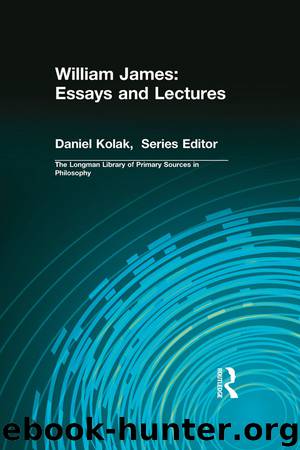William James: Essays and Lectures (100 Cases) by William James

Author:William James [James, William]
Language: eng
Format: azw3
ISBN: 9781315507477
Publisher: Taylor and Francis
Published: 2016-05-23T04:00:00+00:00
Endnotes
1.
Edmund Husserl, Logical Investigations II, quoted in Herbert Spielberg, The Phenomenological Movement: A Historical Introduction, Vol. 1, 2nd edition, (The Hague: Matinus Nijhoff, 1965), p. 113. By “psychologistic” Husserl means what is empirically rather than logically or phenomenologically based. James was also a friend and correspondent of Carl Stumpf (1848–1936), another influential figure in the early phenomenological movement. For a penetrating examination of the relationship between James and phenomenology see Bruce Wilshire’s William James and Phenomenology: A Study of the Principles of Psychology (New York: AMS Press, 1979) and Fashionable Nihilism: A Critique of Analytic Philosophy (Albany, New York: State University of New York Press, 2002).
2.
G.W.F. Hegel, The Phenomenology of Mind, tr. J. B. Baillie, (New York: Dover Publications, 2003), p. 5.
3.
It is instructive to compare James’s radical empiricism with Jean-Paul Sartre’s phenomenological ontology. Both philosophers are direct realists who believe that consciousness is always consciousness of some object other than itself, but Sartre, unlike James, has a well-developed phenomenology of imagination and treats consciousness as a kind of being—an active, non-substantial being that he calls being-for-itself or nothingness (le néant). See Jean-Paul, Sartre, Being and Nothingness: An Essay in Phenomenological Ontology, tr. Hazel Barnes, (New York: Philosophical Library, 1956) and The Psychology of Imagination, tr. anonymous, (New York: Citadel Press, 1965).
4.
First published in the Journal of Philosophy, Psychology, and Scientific Methods, vol. I, No. 18, September 1 1904, collected in Essays in Radical Empiricism, 3–19.
5.
Consciousness or awareness in general.
6.
Finding.
7.
“Ending point” … “starting point.”
8.
Expressing inability to act or intervene in a matter.
9.
First published in the Journal of Philosophy, Psychology, and Scientific Methods, vol. II, No. 7, March 30, 1905, collected in Essays in Radical Empiricism, 61–67.
10.
Philosophy of identity.
11.
A thing animated; infused with a soul.
12.
Reprinted in Memories and Studies, 171–206.
13.
As a whole, completely.
14.
Society for Psychical Research.
15.
A fly swallower, a gullible person.
16.
Bold is the task, magnificent the reward!
Download
This site does not store any files on its server. We only index and link to content provided by other sites. Please contact the content providers to delete copyright contents if any and email us, we'll remove relevant links or contents immediately.
Aircraft Design of WWII: A Sketchbook by Lockheed Aircraft Corporation(32284)
The Great Music City by Andrea Baker(31916)
Call Me by Your Name by André Aciman(20498)
The Secret History by Donna Tartt(19052)
The Art of Boudoir Photography: How to Create Stunning Photographs of Women by Christa Meola(18613)
Shoot Sexy by Ryan Armbrust(17720)
Plagued by Fire by Paul Hendrickson(17405)
Portrait Mastery in Black & White: Learn the Signature Style of a Legendary Photographer by Tim Kelly(16996)
Adobe Camera Raw For Digital Photographers Only by Rob Sheppard(16969)
Photographically Speaking: A Deeper Look at Creating Stronger Images (Eva Spring's Library) by David duChemin(16683)
Ready Player One by Cline Ernest(14643)
Pimp by Iceberg Slim(14488)
Bombshells: Glamour Girls of a Lifetime by Sullivan Steve(14056)
The Goal (Off-Campus #4) by Elle Kennedy(13657)
Art Nude Photography Explained: How to Photograph and Understand Great Art Nude Images by Simon Walden(13031)
Kathy Andrews Collection by Kathy Andrews(11812)
The Priory of the Orange Tree by Samantha Shannon(9064)
The remains of the day by Kazuo Ishiguro(8970)
Thirteen Reasons Why by Jay Asher(8893)
